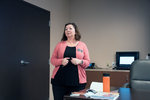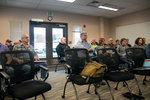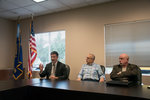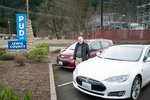



Local officials, business owners and residents are seeing promise in a plan to bring electric vehicle charging stations to the U.S. Highway 12 corridor, following a meeting Friday that saw more than 25 area leaders show up to discuss the idea.
“Tourism is a big deal to Lewis County,” said commissioner Gary Stamper “If you have that connectivity where people know they can come to Lewis County and there’s going to be
charging stations every 10 or 15 or 20 miles, people are going to come.”
Stamper was among many who gathered Friday at the Lewis County Public Utility District office in Morton to hear a presentation from Jennifer Harper, business and programs developer with Energy Northwest, an agency made up of 27 public utility districts and municipalities.
Last year, Energy Northwest took the lead on a project to bring nine charging stations to central and eastern Washington. This year, its top priorities are Highways 12 and 101.
“Very strong turnout, lots of enthusiasm,” Harper said after the meeting. “It’s a great project and a great concept, but I’m really impressed by the community involvement so far.”
The project will be largely funded by state grant dollars, and details won’t be finalized until the funding available this year is announced. But the early proposal Harper showed attendees would put charging stations in Mossyrock, Morton, Packwood, Ashford and Elbe.
Those would be “fast-charging” stations — which can recharge a vehicle in about 20 minutes — and come at a cost of about $90,000 apiece, factoring in equipment, infrastructure, ground lease, utilities and operations for the lifetime of the project. While Energy Northwest is leading the project, the Lewis County PUD is serving as the local liaison. It’s seeking to build local support that will help in the grant process, as well as offering technical expertise on siting and infrastructure.
“This is just great participation from a lot of locally concerned citizens, a lot of great elected officials, strong support,” said PUD Manager Chris Roden. “Having the technical expertise show up as well as the community expertise show up is really neat. … The PUD at this point will be well-served to facilitate the conversation within our community and then just offer all of our technical expertise that we bring on a daily basis.”
Harper said funding for the stations may come from a mix of state grant sources, though primarily from the Department of Transportation. Cost contributions can also come from the station owner, network provider, site host and utility. The stations would be owned by Energy Northwest, which would have lease agreements with the local business owners on whose property they are stationed.
Locations for the chargers have not been finalized, but Mary Kay Nelson, marketing consultant for the White Pass Scenic Byway, said there’s been strong interest.
“We have businesses who have thrown their name in the hat to say, ‘Yes, I want this at my business,’” she said. “They recognize that it’s a business opportunity for them, and they also are serving the public need.”
Many at the meeting talked about the economic potential of the charging network. Leaders are hopeful the infrastructure will draw electric vehicle owners to and through the area, knowing they’ll be able to reach their destination. Harper also noted that host businesses and nearby locations could benefit from the chargers.
“They do tend to walk around town (while their car is charging) and visit the businesses,” she said. “They enjoy stopping and smelling the roses.”
State Rep. Ed Orcutt, R-Kalama, also attended the meeting, and said he believed in the potential of the proposal.
“It’s a very positive indication that people have interest in getting charging stations out here and drawing in people with electric vehicles,” he said. “People see that EVs are going to become more and more commonplace, and we’re going to be left behind if we don’t have a place for them to charge. … Everyone out here stands to benefit, no matter who puts the EV charging in, because you get those folks coming here or coming through here, and they see what we have to offer. … This won’t be their only trip.”
Harper said that the charging stations would be noted by signage, and that EV drivers use apps that show them where nearby stations are located. The PUD is helping Energy Northwest with the grant application, and Harper said she expects to find out about funding availability in March. If the project were to get approved and run on an expected timeline, the stations would be installed by June of 2021 or sooner.
While finalizing the application, Harper said she will rely on the expertise of local leaders to show that community support exists for the project and to help identify specific locations for the chargers.
“Strong community support is imperative,” she said. “I haven’t decided yet how the selection process is going to, but I’d like to receive as much input as I can.”
Orcutt noted that Randle should be considered as another charger location, to allow electric vehicle owners to travel to Mount St. Helens. Others noted that the effort to install fast chargers could lead to nearby businesses to provide their own Level 2 chargers, charge slower but are much less expensive. Those supplemental chargers could prove useful to drivers who are staying overnight or find a fast charger already in use.